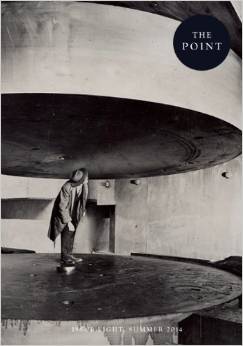No doubt we are thankful to science for “proving” that it is a different experience to read To the Lighthouse than it is to read The Da Vinci Code. But surely the cognitive turn must offer something more than this.
Where the architect’s imagination has floundered, works of comic art like David Mazzucchelli’s “Asterios Polyp” and Chris Ware’s “Building Stories” have emerged as superior examples of paper architecture, buoyed by similar questions about how we inhabit space. Where the architectural comic has gone big in order to grapple with its utopian impulses, comic art has gone small.
Is slavery a sin? What exactly constitutes our “full and complete humanity”? Because he considers such questions not just historically but also philosophically, Davis’s research opens out, like 12 Years a Slave, into broader topics such as freedom, forgiveness, and the possibility of transcendence. Slavery, Davis saw, was a profoundly human problem, and therefore to reckon with slavery would mean to reckon with human nature—that is, to reckon with the kind of being that was simultaneously capable of perpetrating such a system and also of coming to see the need to dismantle it.
As an American who has come of age in the era of what we are constantly told is our decline, I could not help feeling that Shanghai was on the right side of history—and feel drawn to a momentum that I hoped would touch and somehow change me. In fact, from the moment of my arrival, I experienced the city as a series of almost continual frustrations and delays.
I had come to Estonia hoping to find a certain strangeness, perhaps in the form of an administrative subculture where everyone spoke bureaucratese in their sleep—“Deliver the key player to the change agent! Mobilize the mutual learning action plan while there’s still time!” What I found was in some ways stranger.
“What is science for, if it does not equip us to face and absorb the shocks of the future?”
Gladwell’s book succeeded because it eradicated the barriers between disciplines; Pennebaker’s succeeded because it presented one very powerful idea that tied together disparate worlds. But neither book succeeded because it filled my mind with content.
The Soviet Science System presented one enormously influential solution to the perpetual problem of expertise—and then it vanished. Mostly.
To think, with panicked humanists past and present, that science fixes the world in place and deadens the imagination is to come to a rash conclusion both about facts and about death. Even fossils, after all, are “not done with their changes.”
Wonder is not only a peculiarly human passion; it is also one that, at least on this account, underscores the limits of human knowledge. The more we know, the less we wonder.
We may or may not have time to wait, but the public consciousness is not obliged to your sense of what there’s time for.
Perhaps because he was a writer himself, most of his portraits resemble what has come to be recognized as the quintessential jacket-copy photo for a book: the framed artist brooding into the camera (or looking away, for effect) in a tightly shot style that would be perfect to crop and shrink down for a dust-jacket sleeve layout.
The ideal is to be not behind the time but ahead of it, to write a work that would be a philosophy of the future (as Feuerbach tried to do). It is the great hope of many philosophers, particularly political philosophers, to accomplish something like this. If I am right, Rawls did succeed in this aspiration.
A year or so before his death, Trotter announced his intention to close the restaurant and pursue a graduate degree in philosophy. He asked me for advice.
“A true holocaust in the world is the thing we call development,” Rush writes, by which he means “the superimposition of market economies on traditional and unprepared third world cultures by force and fraud circa 1880 to the present.” Are the whites of his books replicating this holocaust, or repairing it? Mating offers an anthropological assessment, and Mortals offers a political one, both deeply persuasive.
So this is Redzepi’s wish: to put a piece of ground in front of a diner and have him figure it out. And once you got over your dismay at being served moss on a plate, maybe you would.
